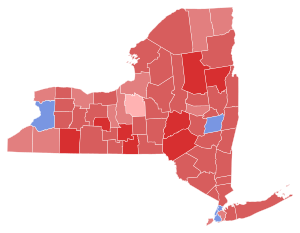|
1962 New York gubernatorial election
The 1962 New York gubernatorial election was held on November 8, 1962 to elect the Governor and Lieutenant Governor of New York. Incumbent Republican governor Nelson Rockefeller won re-election to a second term in office over U.S. Attorney Robert Morgenthau. Democratic nominationCandidates
Withdrew
CampaignRobert Morgenthau began exploring campaign only thirty-three days before the Democratic convention, when President John F. Kennedy and mayor of New York City Robert F. Wagner Jr. met in Washington. With only two weeks before the convention, Morgenthau publicly acknowledged his candidacy and resigned as United States Attorney to actively campaign.[1] Wagner staked his political prestige on the Morgenthau campaign.[1] ResultsThe Democratic state convention met in Syracuse from September 16 to 18.[2][1] The convention opened with a keynote speech from mayor Wagner, who attacked Governor Rockefeller as a reactionary and compared him to Barry Goldwater.[1] Other speakers attacking Rockefeller included former governors Herbert H. Lehman and W. Averell Harriman, who called Rockefeller a "part-time governor" more interested in being President in 1964.[1] The convention delegates nominated Morgenthau for governor on the unanimously on the second ballot, after he fell seven votes short on the first ballot.[1] At the opening of the convention, Morgenthau appeared likely to win a first-ballot majority with the support of both the Bronx, where party boss Charles A. Buckley announced he would lead at least 106 of the 110 delegates to support Morgenthau, and Brooklyn, which abandoned favorite son Abraham Beame on the first ballot. Buckley's endorsement was considered particularly decisive, since Wagner had supported a primary challenge to Buckley earlier in 1962 and sought to unseat him as Bronx party boss.[1] However, when the roll was called, Morgenthau's base of support in Manhattan and Westchester County was less solid than expected, and the first ballot left him seven votes short. In Manhattan, reformist delegates had voted for Samuels or Stratton, while in Westchester, O'Connor had captured fifteen of the forty-five delegates.[1]
After the second ballot showed Morgenthau making inroads in Queen, O'Connors base, support for O'Connor collapsed. Morgenthau ultimately won fifty delegates in Queens before the vote was made unanimous.[1] AftermathThe Liberal Party met on September 19 and endorsed the Democratic ticket. General electionCandidates
Results
ReferencesWorks cited
|
|||||||||||||||||||||||||||||||||||||||||||||||||||||||||||||||||||||||||||||||||||||||||||||||||||||||||||||||||||||||||||||||||||||||||||



